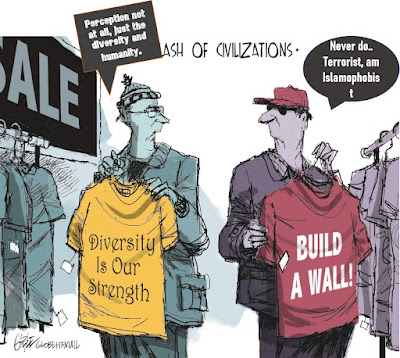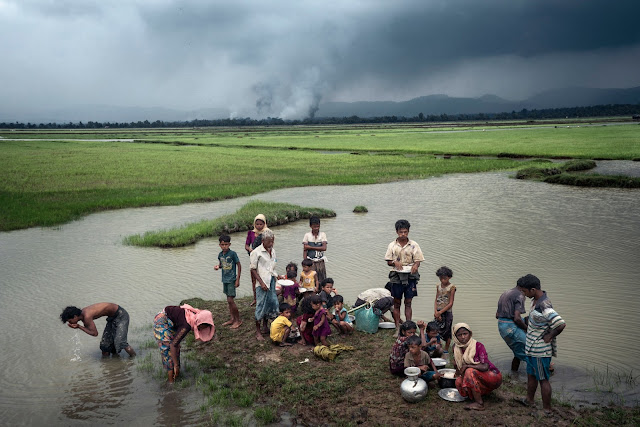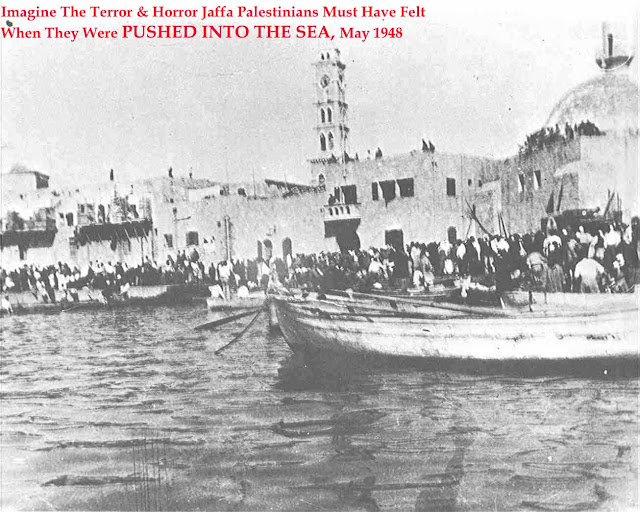Perception shift needed to end ‘clash of civilizations’ mentality??
Perception shift needed to end ‘clash of civilizations’ mentality??
Is it just due to perception? No, Not exactly, but the duel between the satanic impulse of western "colonial capitalist" vs "Equitable humanity in Islam"
On the contrary, an extremist attack or utterance overwhelms such initiatives and reinforces the perception of two antithetical cultures locked in inevitable and immutable conflict. The recently renewed uproar in France over cartoons of the Prophet Muhammad, and the shocking atrocities that followed, clearly demonstrate the deep cultural divide that continues to roil relations between Islam and the West.
Why have these cartoons deepened this fissure anew? Non-secular Muslims perceived these caricatures in a strictly religious framework, and the resulting anger and indignation spanned the entire Islamic world, from North Africa to Indonesia. Many Muslims regarded the images as another deliberate and vicious Judeo-Christian attack on Islam — a continuation of the Crusades by other means. Why, some ask, are attacks on Islam and its sacred symbols permitted, or even encouraged, while criticizing Israel or Holocaust denial is regarded as anti-Semitic and even punishable by law? Likewise, why are the French flag and national anthem protected against desecration, while the most revered symbol of the Islamic faith is not?
Many in the West, on the other hand, regarded the attacks in France, and previous and subsequent barbaric killings of innocent civilians in European cities, as outright assaults by “Islamist terrorists” against Western culture and the West’s way of life. These infamies, they say, were an attack on the West’s defining values and freedoms. In the wake of these attacks, public awareness of the depth of the cartoons’ offensiveness has diminished.
With French President Emmanuel Macron at the forefront, Western leaders have argued for a strong and unwavering response to the recent murders in France. Even though the overwhelming majority of Muslims have always denied that murderous extremists represent their faith, these tragic events became yet another opportunity for some on both sides to score political points and promote their own narrow agendas. While some opined that Islam needs reform, others claimed that the solution is to restrict Muslim immigration to Europe. And some Muslims, in response, want all Muslims to hark back to the caliphate — a time when the Islamic world was united and powerful.
Given all the upheaval, confusion, and polarization in the world today, the last thing that either Islamic or Western civilization needs is new reasons for division and conflict.
Mohamed ElBaradei
The truth is that the two cultures have profound philosophical differences regarding the meaning and scope of freedom of expression and belief. Secular Western culture has an expansive view of these freedoms, regarding them as ultimate guarantees against oppression and authoritarianism. The West thus gives precedence to freedom of expression over the sanctity of religious beliefs, regarding the latter as ideas that, like any other idea, should be open to criticism and even derision.
Islamic culture, by contrast, regards religious beliefs as sacrosanct and above the temporal fray, and considers mockery of any Abrahamic religious belief or symbol to be an attack against everything that Muslims hold sacred. The difficult ongoing political and social transitions in much of the Islamic world mean that many Muslims feel the need to rely even more on the certainties of their faith as a counterweight to the rapid changes in the world. They are not willing to tolerate an attack on the one constant in their lives that gives them solace, hope, and true meaning.
Given all the upheaval, confusion, and polarization in the world today, the last thing that either Islamic or Western civilization needs is new reasons for division and conflict. What is badly needed instead is a wide-ranging dialogue between the two cultures that puts all contentious issues on the table, with the hope of gaining a sympathetic understanding of the other’s perspective and thus narrowing the gap that exists between both. Whatever the ultimate outcome, the goal on both sides must be to agree on some formula of mutual respect and self-restraint that takes into account each culture’s particular sensitivities.
But for any dialogue to succeed, it must confront head-on the larger issue underlying the recent crisis: The distrust that exists between the two cultures. The discussion should therefore take place at the grassroots and not be limited to the elite. And it should frame intercultural engagement not as an inevitable clash of civilizations, but as an indispensable opportunity to seek mutual accommodation. Only with this shift in perception and mindset will it be possible to build a genuine partnership of equals between Islam and the West.
• Mohamed ElBaradei is a Nobel Peace Prize laureate



Comments
Post a Comment